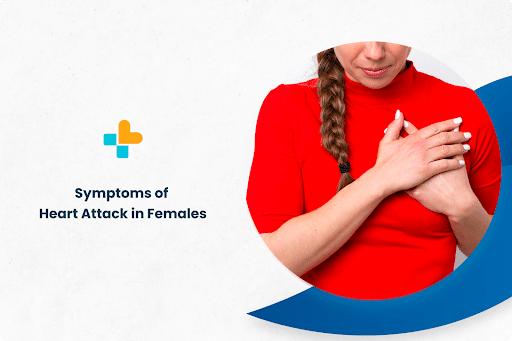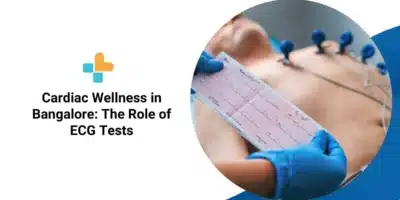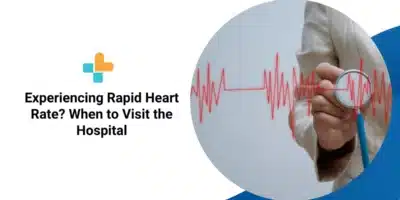The global burden of heart disease is on a significant rise and is also a major cause of death, both in men and women. Of all the cardiovascular diseases, heart attack and stroke account for nearly 85% of deaths globally. Most commonly, behavioural risk factors, such as poor lifestyle choices, decreased physical activity, alcohol consumption and high stress are significantly contributing to heart diseases. All of these account for a rise in blood glucose levels, blood pressure, blood lipids, and obesity, which are all the direct risks of heart attacks. A person’s lifestyle habits determine the likelihood of having a heart attack. In spite of widespread knowledge about the symptoms of a heart attack and preventive measures, we often tend to see the confusion that arises when people show signs of heart attack symptoms.
What is a Heart Attack?
Myocardial infarction, also known as a heart attack, refers to a medical emergency where there is an obstruction or reduction in oxygen-rich blood flow to the heart. A heart attack is a life-threatening emergency that needs prompt medical attention to restore the blood flow to the heart muscle. Prolonged decrease or cut down of the blood flow to the heart muscle can cause permanent damage to the heart muscle or even death.
Myocardial infarction, also known as a heart attack, refers to a medical emergency where there is an obstruction or reduction in oxygen-rich blood flow to the heart. A heart attack is a life-threatening emergency that needs prompt medical attention to restore the blood flow to the heart muscle. Prolonged decrease or cut down of the blood flow to the heart muscle can cause permanent damage to the heart muscle or even death.
A heart attack occurs when the coronary arteries that supply blood to the heart muscle are blocked or narrowed due to the build-up of fat, cholesterol, cellular waste, or other substances which are called plaque. The accumulation of fatty deposits (plaque) in the arteries is called atherosclerosis. When a plaque ruptures, it quickly forms a blood clot, which is the actual cause of a heart attack. The heart muscle begins to suffer within 30 minutes of losing or reducing blood supply.
Heart attacks are more common in men when compared to women. Also, certain signs and symptoms of heart attack differ in men and women that we may often overlook. Unlike men, women usually don’t experience severe chest pain that radiates down their shoulders but may experience specific symptoms that may go unnoticed.
Some of the Common Symptoms of Heart Attack in Females are:
- Chest Pain or discomfort: It is the most common symptom of a heart attack in both males and females, which is usually experienced as tightness in the chest, squeezing, and pressure that severely aches.
- Upper body pain: This symptom is mostly experienced in women than in men. Pain in the upper back, neck, and jaw that can be gradual or sudden is often overlooked, especially when focused on chest pain and pain in the left arm. Such kind of unexplained or typical pain should be addressed immediately by a medical practitioner to avoid further complications arising from them.
- Shortness of breath: If one experiences trouble breathing, chances are high that it could be a warning symptom of a heart attack, especially when experienced with one or more symptoms of a heart attack. In some cases, it is possible for women to experience heavy breathing or shortness of breath while lying down, which might ease if they are sitting upright.
- Stomach pain: In some cases, stomach pain or abdominal pain can be misdiagnosed as heartburn, indigestion, flu, or a stomach ulcer, which can be a sign of an impending heart attack. There is a possibility that women might experience nausea and abdominal pressure, which are usually not interpreted as signs of a heart attack.
- Unusual fatigue: It is one of the symptoms of a heart attack when women complain of unusual extreme fatigue or tiredness even when they are in a resting position. Performing simple tasks or activities that do not require much physical effort can cause exhaustion, which may be a sign of a heart attack.
- Unusual/excessive sweating: Cold sweats are one of the most common signs of a heart attack. If one experiences sweating even without excessive work stress, it can be a trigger symptom of a heart attack. It is imperative to seek medical attention if one experiences excessive sweating without exercising or engaging in stressful physical activities.
In conclusion, apart from ‘silent heart attacks’, identifying the symptoms and signs of heart attacks on time can keep you away from the risk of having a heart attack. Proper diet, physical activity, quality sleep, and adequate intake of water are some of the simple measures that can prevent the risk of cardiovascular diseases. Do not forget to seek immediate medical attention if you experience any of the above-mentioned symptoms at any point in time. An early diagnosis and medical intervention can prevent further injury to your heart muscle and save your life.
Why Choose Ayu Health?
Ayu Health are the most trusted chain of hospitals in India with highly experienced doctors across several specialties. As healthcare providers, we are committed to providing our patients with high-quality care at an affordable cost. If you are looking for an immediate diagnosis to check your health parameters that can indicate an underlying risk of heart disease, you are just a click away to reach out to our Ayu Health team. Book a diagnostic test at your convenient time and get your vitals and other parameters assessed. Ayu Health have expert cardiologists with over 15 years of experience who deliver seamless care to patients.
Our Hospital Locations
Cardiology Surgery Hospitals in Chandigarh | Cardiology Surgery Hospitals in Bangalore | Cardiology Surgery Hospitals in Jaipur | Cardiology Surgery Hospitals in NCR | Cardiology Surgery Hospitals in Hyderabad
Our Doctors
Cardiology Surgery Doctors in Chandigarh | Cardiology Surgery Doctors in Bangalore | Cardiology Surgery Doctors in Jaipur | Cardiology Surgery Doctors in NCR | Cardiology Surgery Doctors in Hyderabad
About the Author

Dr. Magesh Balakrishnan
Dr. Magesh Balakrishnan is a renowned cardiologist currently practicing at Ayu Health, Bangalore.
He has 16 years of experience in this field. He has excellent skills in performing all cardiac diagnostic procedures/ tests. He has performed emergency and elective angiographies and angioplasties, device implantation (Pacemaker, AICD & CRT)




